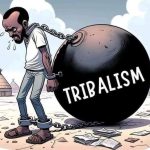Every city wears a story. Some wear theirs like medals; others, like scars. Benin City wears both. Once the capital of an empire that terrified invaders, dazzled explorers, and defied the British long before Nigeria was born, it is now called The Ancient City — not as homage, but often as accusation. The title that once crowned its glory has become a reminder of its decay. The roads are tired, the drains long dead, the physical infrastructure outdated — nothing modern about the Ancient Capital; the grandeur buried beneath the weight of time and successive government excuses.
Monday Okpebholo and Denis Idahosa did not just run a campaign; they ran a prophecy. MODEN — the fusion of Monday and Denis — sounded harmless at first, almost like a coincidence. But now, in the dust, sweat, and steel of a resurgent Edo, it reads like destiny written in concrete.
For decades, Benin City, the proud heart of a kingdom that once commanded half of West Africa, has been described with one word — ancient. Once glorious, now derided. The bronze heads remained, but the roads were broken. The palaces continued to stand, but the drains stank. Generations came to equate heritage with hardship. The city became a relic admired by historians and pitied by travellers.
Then, as if history grew tired of waiting, bulldozers returned to Ramat Park. The first state-funded flyover in Edo’s history began to rise — not as a vanity project, but as a statement: we too can build. Now, a second flyover has broken ground at Adesuwa–Sapele Road Junction — and with it, a new psychology is forming in the Edo consciousness. The kind that looks at progress and no longer whispers impossible.
But perhaps the most profound change isn’t even in Benin City. It’s on the long, winding highway from Benin to Auchi through Ekpoma — a road that, for nearly twenty years, was more metaphor than mobility. Today, that same route, with its ongoing modernisation, is wearing a new face. Smooth. Wider. Beautiful. Modern.
Drive through Uromi, Auchi, Igarra, Idogbo, Irrua, even Udomi — and you’ll feel it. My own Ewu, once forgotten by planners and remembered only by politicians during campaigns, now hums with the vibration of renewal. I hear a twenty-six billion naira interchange terminal has been approved to modernise Ewu, and I was there when the Governor pledged, at Ehanlen Market — with the deities Izele and Ogogo statues standing still, listening — to construct a new road under the recently signed supplementary budget.
The same hum reaches Blessing Agbebaku’s Owanland, Jerret Tenebe’s Etsako heartland, Donald Okogbe’s Akoko-Edo, Ize-Iyamu’s Iguododo and Oredo, and Igbinedion’s Ovia. Everywhere, something is shifting — asphalt where there was dust, bridges where there were gullies, hope where there was resignation.
For the first time in decades, supplementary budgets no longer look like receipts for excuses. They look like redemption notes — paying back a moral debt long owed to the forgotten communities of Edo. And the people, who always know before the politicians do, have already given them a name: “Monday and Denis — the Modernisers.”
They’re not just building infrastructure; they’re reconstructing hope and faith — proving that leadership can, in fact, dig the ground and not just talk about it. If this tempo holds, Governor Okpebholo and Deputy Governor Idahosa may not only transform Benin City but also redefine governance itself in Edo — making modernisation not a promise but a culture.
Like the fond memories Edo people have of the enduring quality of the Airport Road constructed by Oshiomhole, when the dust settles and the headlines fade, history will not remember the budget figures or the party slogans for Moden’s modernization efforts in Edo state. It will remember this: they found an ancient city — and left behind a modern capital; they found despair — and raised bridges; they found mockery — and built meaning. Edo people replaced rhetoric with results — a smooth talker with a man who lets compassion speak through action.
And somewhere between Ramat Park, Adesuwa Junction and the cassava fields of Ewu, the whisper grows louder:
A New Edo Has Risen.
Saintmoses Eromosele writes from his cassava farm in Ewu and Eidenu, where he listens to the sound of bulldozers and calls it the rhythm of rebirth.




Let your comments be reasonable and respectable.